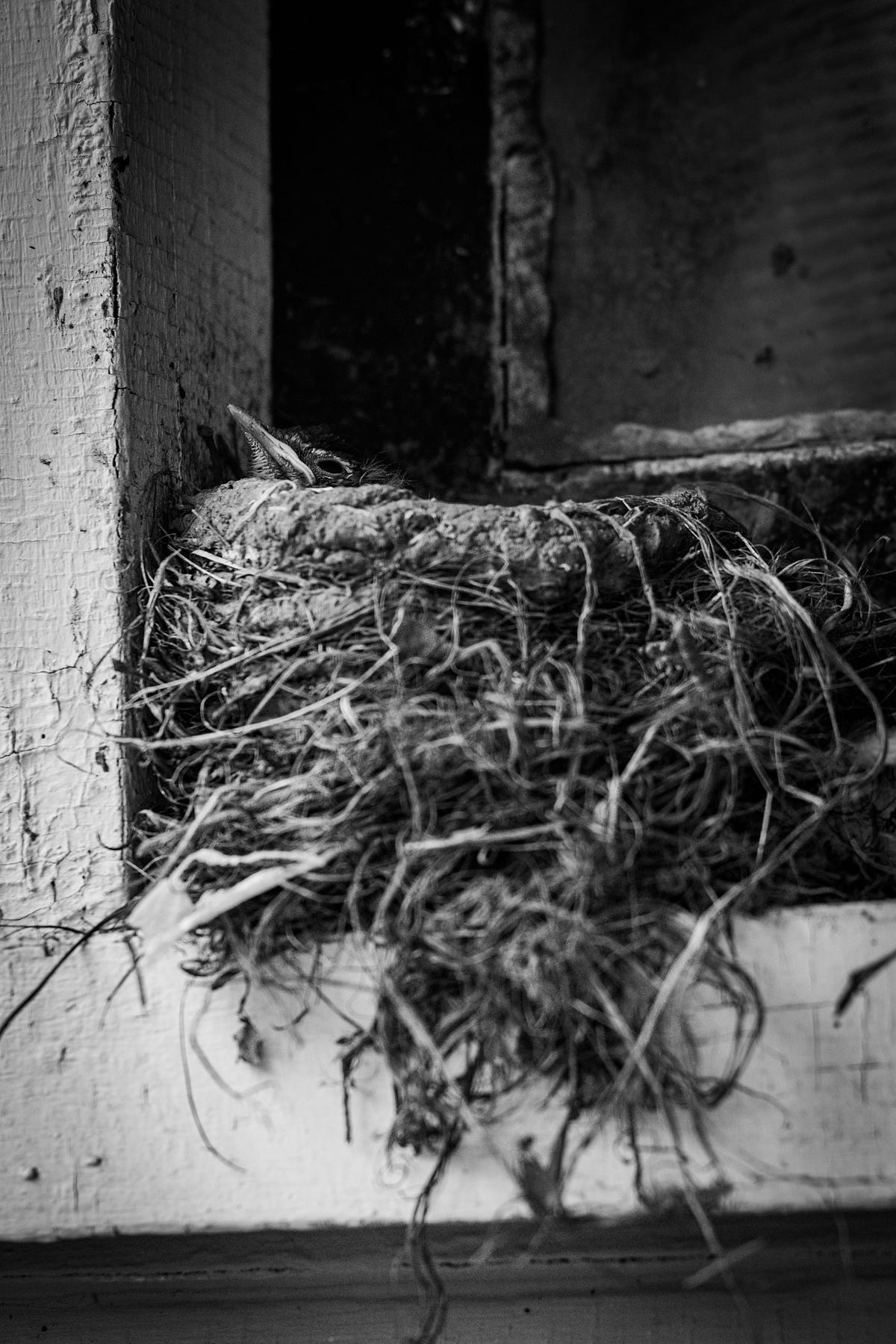On the first day, the robin brushes up on our porch, scratches at the window above the back door, and drops three tiny sticks on a ledge that cannot be more than five inches wide. The sticks fall to the warped, unfinished decking, where they will remain until removed by forces apathetic to human intervention. The robin flies away.
She flies up again with three more sticks, again places them on the ledge, and again the sticks flutter to the deck. The robin tilts her head to track the components of her would-be brooding space. Unfazed, she flies off and returns with more sticks.
We watch half smiling through the steam rising from our coffee. It happens five or six more times. “Good luck, stupid.” Off to work.
On the second day, same thing.
On the third day, same thing.
By the fourth day, the sticks on the deck are somehow no longer “sticks” but more like what English-speaking humans would call “brush,” held together by dried birdshit. Alarmingly, there is also a collection of brush on the ledge, such that it may not be correct to call it “brush” anymore but rather the beginnings of a “nest.”
Were it not for the slightness of the ledge, the back porch would be decent real estate for a growing family of robins. It is covered from the elements, eyes of predators, and easy access of thieves. But the ledge is a structural defect so significant that it should drive the mother to find better housing. It doesn’t. She might lay eggs in that mess. And then what? It’s only a matter of time until the eggs fall to the deck, since there can be nothing in that small space adequate to contain the rolling of little blue marbles. We’ll have to scrape up the mess, and maybe it won’t be a regular egg mess, maybe it will be a gross, gooey bird fetus mess. Unless the dogs get to it first. Bleah.
“The hell are you doing?” I ask her. No reply. “Ignorant fucker. Go away!” She does, but not for long. She is swooping back with more sticks every few minutes, dropping some, leaving some. Swooping, dropping, leaving.
On the sixth day, there is something like a bowl made of buckwheat noodles growing up and leaning forward out of the ledge. It is a masterwork of precarity, but it could hold an egg. One. Maybe. This, as I consider it, is even worse than I had feared. At some point, a baby bird may hatch out of that egg. And then what? It’ll fall out of the nest and the children will find a little bird corpse. Then the dogs will get it. Bleccch.
We mostly forget about the nest for two weeks. Then one morning we see them: four — four — tiny beaks, like spades jabbing upward. Mama is swooping back and forth again, but this time with worms or whatever it is these underdeveloped dinosaur wieners eat. I stare in awe up at the ledge for a while, cross myself, and go back inside. This development, as I consider it, is the worst yet. Now four of these mutants are surely going to fall eight feet onto our deck and make it even filthier than usual. And then what? A scene of carnage rivaling Gettysburg, that’s what. I’d rather the dogs take care of this one but bleeeaaaarrrrrgh.
A robin is not an interesting bird to write about. This is so even if you concede that birds are interesting to write about, or read about, which I do not. While one might find sufficient poetic juice to squeeze from, say, a bird of prey or a flightless waterfowl, the robin remains singularly uninteresting among birds. Its song isn’t especially beautiful. It doesn’t symbolize anything. Except for the fact that its scientific name is turdus migratorius, it has no inherent comedic value. It is one of the most common creatures in the Midwest.
Not only is the main character of our story uninteresting, but the story itself is dull. Here’s how it ends: After a few days, three of the babies fly away. One scruffy fledgling remains who cannot seem to summon the nerve required to hop off the ledge. When he finally does, he clumsily flutters down to the deck, where he sits for a moment, his ordinary brown head cocked, his inky black eye peering vacantly up at me through our back door. “Ah, this will be our casualty, at long last,” I worry. I open the door. The runt flies away. The end.
This is the story of the robin, as boring as it is true. A common bird does a common thing and nothing dies. You expect calamity, but you get the mundane. This theme is at least as archetypal as hubris, but still: yawn. There is no deeper truth to be gleaned here, it is simply the blundering juggernaut of nature, amorally charging ahead, immune to consequence, victory, or sorrow. But it is the writer’s job to connect things that have no connection, no matter how jacked up or contrived, and I find myself in this moment very much in need of redemption stories, of heroes surviving peril despite all odds, of courageous animals who build homes for their babies, of anything that says “maybe it’s all going to be okay,” even when a tragic ending appears certain.




